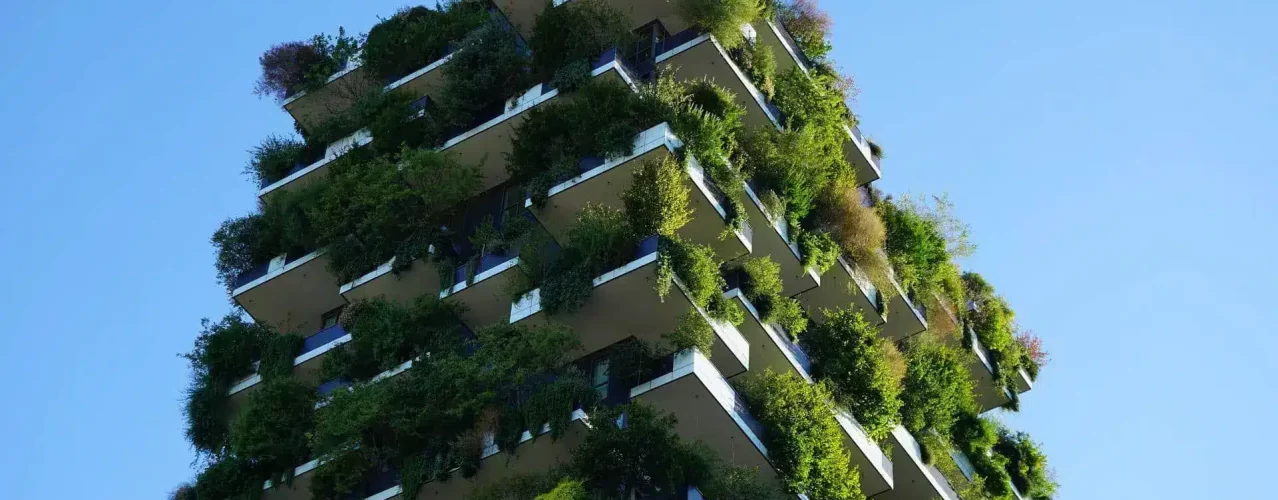
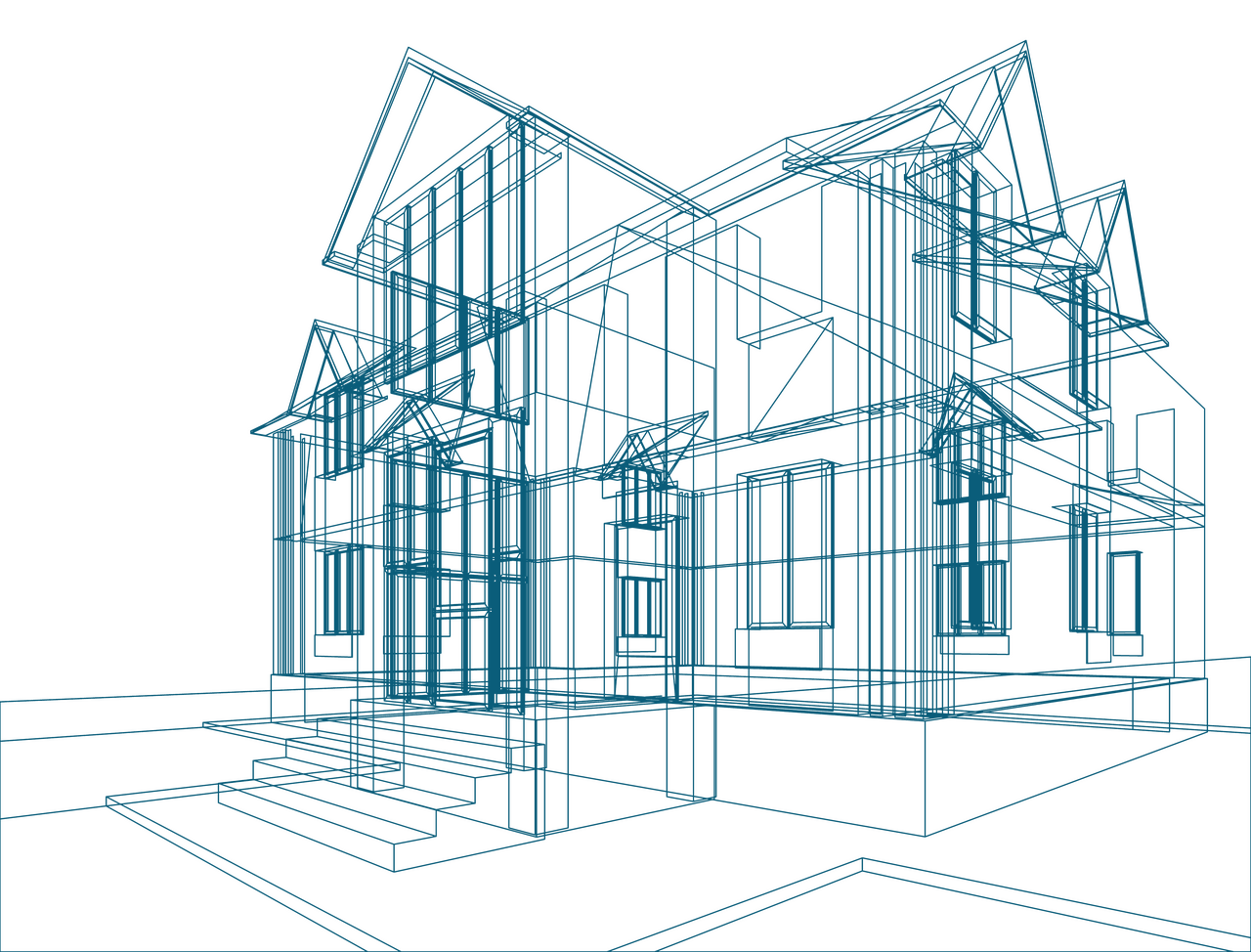
Market report
Sustainability in construction industry
Gain valuable insights into the European architectural market with the European Architectural Barometer market report. Stay informed on trends and developments impacting architects today.
News I published 20 June 2022 I Dirk Hoogenboom
European architects are actively involved more in sustainability than in circularity
Buildings and building construction are major contributors to annual emissions of greenhouse gasses. Also, the construction sector is known to use vast amounts of resources and produce a lot of waste. Therefore, it is no surprise that sustainability and circularity are hot topics in the world of building construction, and the amount of initiatives to achieve a more sustainable and circular construction process is increasing.
A top-down example of such an initiative is the European Green Deal (EGD), which we discussed in a previous article. Most architects think the effect of this set of policies, which is built around the aim to achieve a climate-neutral European Union in 2050, will surely be felt in the construction sector. This shows attention for and effects of future aims, but what about the current level of sustainability and circularity in the construction sector?
Given their central role in and influential role throughout the building design and construction process, architects are not only excellent indicators of the impact of initiatives like the EGD on their sector, but also of the current level of sustainability and circularity in the European construction sector. That is why, for the Q1 2022 report of USP Marketing Consultancy’s European Architectural Barometer, we asked 950 architects from eight European countries to what extent their companies are actively involved in sustainable and circular construction.
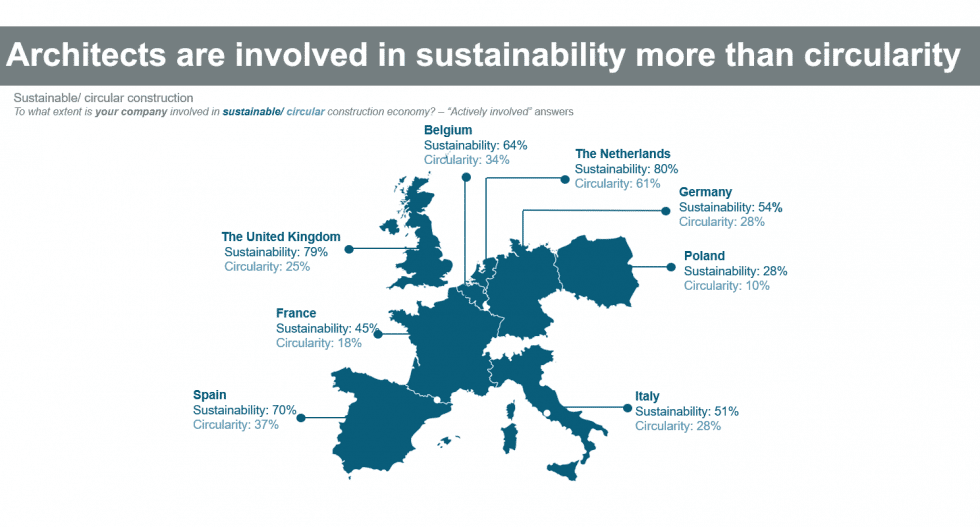

Majority of European architects are actively involved in sustainable construction
On average, a 58% majority of European architects claim that their companies are actively involved in sustainable construction. Zooming in on specific countries, there are significant differences though. Dutch and UK architects are frontrunners, as four out of five architects report to be actively involved in sustainable construction. On the other side of the spectrum, only 28% of the Polish architects reported that their companies are actively involved in sustainable construction.
Involvement in circular construction is a lot smaller
Where it comes to being involved in circular construction, it is clear that circular construction is not as common as sustainable construction yet. Only 29% of European architects report that their companies are actively involved in circular construction. Again, the Dutch architects lead the way with 61% being actively involved in circularity. They are followed by Spain and Belgium, who are above the European average with 37% and 34% respectively. Polish architects are again least involved, with only 10% reporting to be actively involved in circular construction.
Awareness is key
In Europe, only 8% of architects reported to be unaware of the concept of sustainable construction and a quarter reported to be unaware of the circular construction concept. In Poland, with the lowest active involvement in both sustainability and circularity, 29% of architects was unaware of sustainability and 60% was unaware of circularity. In the Netherlands, however, all architects claimed to be aware of these concepts. This clearly indicates that where a concept is known more, it is likely that more architects will be involved in it.
The question remains what these architects are aware of exactly, though. Sustainability and circularity are broad terms that can be explained in different ways. To use the above information effectively, for instance for marketing campaigns targeting architects that care a lot about sustainability and circularity, awareness of how they explain the concepts and what they consider their most important aspects is key. For a full overview of architects’ awareness of, involvement in and ideas about sustainability and circularity, we refer you to the Q1 2022 report of USP Marketing Consultancy’s European Architectural Barometer.

Read more
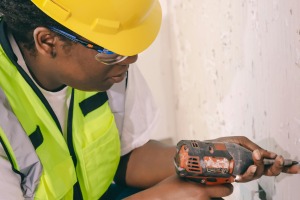

12 December 2024 I Dirk Hoogenboom
Buying Behavior of Handymen
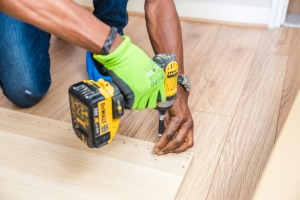

12 December 2024 I Henri Busker
Handymen Radar – Private Labels vs. Branded Products


12 December 2024 I Dirk Hoogenboom
Sustainability and Painting – What Matters Most?
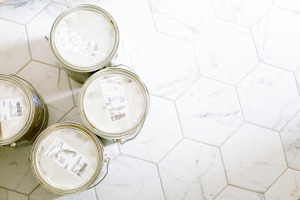

12 December 2024 I Zeynep Kutsal
Are European Painters Getting Younger?

Fresh Insights Await
Our relevant reports
Delve into the newest findings across various market segments, crafted for a cutting-edge overview. Explore our insightful reports, brimming with up-to-date data, trend analyses, and in-depth examinations, all tailored to provide you with a comprehensive understanding of the current market dynamics.
Construction
Home Improvement
Installation
Special reports
Construction
Smart Materials and Buildings Q4 2024
2024 85 pages
Explore the evolving future in construction sector among European architects in Q4 2024. Delve into the factors driving material preferences and the impact on construction aesthetics and sustainability.
2,000 Euro
Construction
Digitalisation and BIM H2 2024
2025 64 pages
Uncover the preferred purchase channels of contractors in H2 2024, and understand how purchasing behaviors evolved. This report provides insights into the factors influencing purchasing decisions among contractors.
6,000 Euro
Construction
Decision making process Q3 2024
2024 87 pages
Unveil the decision-making processes in the construction industry through the lens of European architects. Discover the factors that influence crucial decisions and the interplay among different stakeholders.
2,000 Euro
Construction
Prefab H1 2024
2024 63 pages
Discover the adoption rate and benefits of prefabrication technology among European contractors in H1 2024. Understand the driving forces behind prefab usage and its impact on project efficiency and cost-saving.
6,000 Euro
Construction
Future of construction Q2 2024
2024 82 pages
Explore the evolving future in construction sector among European architects in Q2 2024. Delve into the factors driving material preferences and the impact on construction aesthetics and sustainability.
2,000 Euro
Construction
Sustainability 2024
2024 72 pages
Painter Insight Monitor 2024 will focus on understanding the specific needs, preferences, and challenges faced by painters when it comes to sustainable products.
11,000 Euro
Home Improvement
DIY vs DIFM Q4 2024
2025 76 pages
Explore the prevailing trends between DIY and DIFM in Q4 2024. Understand consumer preferences and the factors influencing their choice between DIY and DIFM.
3,500 Euros
Home Improvement
Branding Q3 2024
2024 74 pages
Discover the power of branding in the home improvement sector. Explore how strong branding influences consumer preferences and purchase decisions.
3,500 Euro
Home Improvement
European Garden Monitor
2023 43 pages
Explore the European Garden Monitor, a comprehensive platform dedicated to garden health monitoring in Europe. Access valuable resources and expert advice today.
12,000 Euro
Home Improvement
Purchase channels Q2 2024
2024 90 pages
The European Home Improvement Monitor offers valuable insights on purchase channels in the European home improvement industry, examining the evolving preferences and behaviors of consumers across traditional retail and emerging online platforms.
3,500 Euro
Home Improvement
Sustainability Q1 2024
2024 81 pages
Delve into sustainability trends in the home improvement sector in Q1 2024. Discover consumer preferences and the shift towards eco-friendly home improvement solutions.
3,500 Euro
Home Improvement
DIY versus DIFM Q4 2021
2024 113 pages
This report is a must-have if you’re in the home improvement industry. It provides a wealth of information on the behaviour of DIY and DIFM consumers, their motivations, and the factors that influence their purchasing decisions.
3,150 Euro
Installation
Training needs Q1 2025
2025 100 pages
This report offers an overview of installers’ habits and preferences concerning their education. Furthermore, the report encompasses the pervasive challenge of workforce shortage and explores the sector’s strategies for resolving this issue.
3,250 Euro
Installation
Media orientation Q4 2024
2025 128 pages
The European Mechanical Installation Monitor report provides a detailed analysis of the plumbing and HVAC industry. This report specifically focuses on Media Orientation in the industry.
2,800 Euro
Installation
Services in the installation sector Q4 2024
2025 102 pages
This report provides a comprehensive view of the installer's requirements for services from manufacturers. Within the report, you will find information on the most needed services in each category: commercial processes, engineering, products & installation, and repair & maintenance. It also examines the services that installers offer to their customers.
3,250 Euro
Installation
Prefab Q3 2024
2024 110 pages
Uncover the adoption of prefabricated products in HVAC installations during Q2 2022. Delve into the benefits and challenges associated with prefabrication in HVAC.
2,800 Euro
Installation
Prefab Q3 2024
2024 119 pages
This report offers a comprehensive view of the installers’ involvement and needs regarding prefabricated electrical installations.
3,250 Euro
Installation
Smart & Connected Products Q2 2024
2024 120 pages
This report provides a comprehensive view of the attitudes of installers toward smart building solutions, specifically among electrical installers and their clients. In the report, you will find insights into the installers' experiences with installing smart products and the willingness of end users to invest in such solutions, as well as their motivations and pain points.
3,250 Euro
Special reports
European Sustainability Report 2024
2025 51 pages
This report provides in-depth insights based on triangulation of key market information and data as well as data from USP Marketing Consultancy’s key monitors that are carried out year in, year out. The focus of this report is on the most important stakeholders within the construction industry, namely architects, contractors, electrical and HVAC installers within The United Kingdom, The Netherlands, Belgium, Germany, Poland, France, Italy, and Spain.
3,950 Euro
Special reports
European Sustainability Report 2024
2024 51 pages
This report provides in-depth insights based on triangulation of key market information and data as well as data from USP Marketing Consultancy’s key monitors that are carried out year in, year out. The focus of this report is on the most important stakeholders within the construction industry, namely architects, contractors, electrical and HVAC installers within The United Kingdom, The Netherlands, Belgium, Germany, Poland, France, Italy, and Spain.
3,950 Euro









